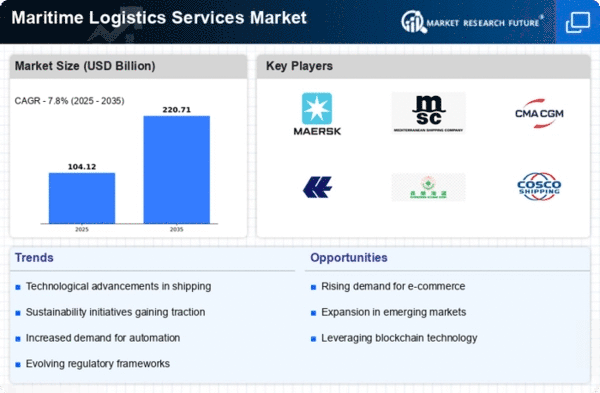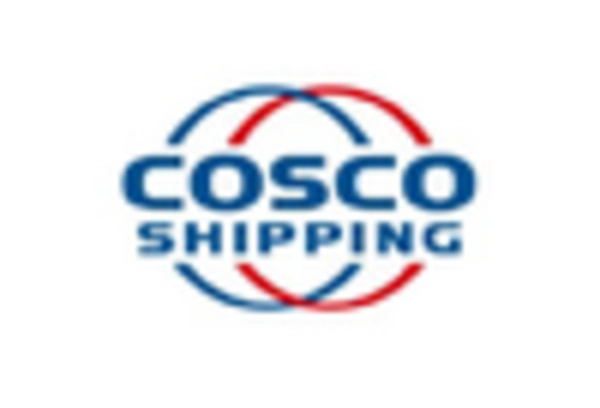Market Trends
Key Emerging Trends in the Maritime Logistics Services Market
In the highly competitive landscape of the Maritime Logistics and Services market, companies are deploying strategic initiatives to secure market share and position themselves as leaders in providing efficient and sustainable solutions to the global shipping industry. A fundamental market share positioning strategy involves offering comprehensive and integrated maritime logistics services. Recognizing the multifaceted needs of shippers, port operators, and other stakeholders, companies tailor their services to cover the entire logistics chain – from port operations to inland transportation. This approach positions them as versatile providers capable of delivering end-to-end solutions that cater to the diverse requirements of the maritime industry, showcasing adaptability and expertise in meeting the complex demands of global supply chain management.
Strategic partnerships and collaborations are essential components of market share positioning within the Maritime Logistics and Services market. Companies understand the interconnected nature of maritime logistics and are forming strategic alliances with port authorities, shipping companies, technology providers, and other stakeholders. These partnerships facilitate the integration of diverse services seamlessly into existing maritime ecosystems, ensuring interoperability and compatibility. Collaborative efforts strengthen a company's market position by leveraging collective expertise, resources, and technological capabilities, contributing to the successful adoption of integrated maritime logistics solutions across the industry.
Moreover, a focus on digital transformation and the adoption of advanced technologies is paramount for market share positioning in the Maritime Logistics and Services market. Companies that invest in digital platforms, Internet of Things (IoT) solutions, artificial intelligence (AI), and blockchain to enhance visibility, optimize supply chain processes, and improve overall operational efficiency differentiate themselves as leaders in the era of digitized maritime logistics. This strategic approach not only aligns with the industry's move towards a more data-driven and transparent approach but also positions companies as innovators capable of providing cutting-edge solutions for the evolving needs of global shipping.
Strategic marketing and communication efforts play a pivotal role in market share positioning within the Maritime Logistics and Services market. Companies that effectively communicate the value of their comprehensive logistics solutions, including efficiency gains, sustainability practices, and seamless connectivity, can differentiate themselves in the competitive landscape. Engaging in targeted marketing campaigns, participating in industry events, and showcasing successful case studies contribute to building brand recognition and trust among maritime stakeholders. Successful marketing strategies position companies as leaders in the Maritime Logistics and Services market, influencing procurement decisions and securing a significant market share.
Additionally, a customer-centric approach is critical for market share positioning. Companies prioritize understanding the unique needs and challenges faced by shippers, cargo owners, and other clients. By tailoring their logistics services to address specific requirements, improve supply chain visibility, and enhance overall operational performance, companies demonstrate their commitment to customer satisfaction. Establishing strong relationships with maritime clients not only fosters brand loyalty but also positions companies as reliable and responsive partners, crucial for securing and expanding market share.
The integration of sustainability practices is becoming a strategic market share positioning element in the Maritime Logistics and Services market. With a growing emphasis on environmental responsibility, companies that invest in fuel-efficient vessels, explore alternative fuels, and implement measures to reduce carbon emissions differentiate themselves as contributors to a more sustainable maritime industry. This strategic alignment with global sustainability goals not only addresses environmental concerns but also positions companies as leaders in providing eco-friendly and socially responsible logistics solutions.
Furthermore, companies are recognizing the importance of resilience and adaptability in their market share positioning strategies. As the maritime industry faces geopolitical uncertainties, trade disruptions, and global events, companies that emphasize resilient supply chain strategies, multi-modal transportation options, and contingency plans position themselves as reliable partners capable of navigating unforeseen challenges. This strategic approach contributes to the industry's ability to maintain operational efficiency and adaptability in a dynamic and unpredictable global landscape.


















Leave a Comment